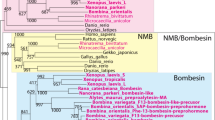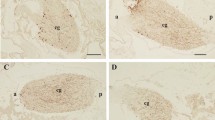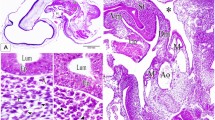Abstract
THE gastrointestinal hormones gastrin and cholecystokinin (CCK) are structurally and functionally related in that they have identical COOH-terminal pentapeptide sequences, which represent the biologically active portions of the molecules. The rest of each molecule only modifies its activity quantitatively and determines relative potencies for various targets. This has suggested that the two hormones have evolved from a common ancestral molecule1,2. To test this hypothesis we have investigated the occurrence of gastrin and CCK in different vertebrate species by immunocytochemistry and radioimmunochemistry. We now present evidence that in amphibians and teleosts gastrin and CCK are no longer recognisable as separate hormones.
This is a preview of subscription content, access via your institution
Access options
Subscribe to this journal
Receive 51 print issues and online access
$199.00 per year
only $3.90 per issue
Buy this article
- Purchase on Springer Link
- Instant access to full article PDF
Prices may be subject to local taxes which are calculated during checkout
Similar content being viewed by others
References
White, A., Handler, P. & Smith, E. L. Principles of Biochemistry fifth edn 916 (McGraw-Hill Kogakusha, Tokyo, 1973).
Dockray, G. J. Gastroenterology 72, 344–358 (1977).
Rehfeld, J. F. First. int. Symp. Gastrointestinal Hormones, Asilomar, Abstr. no. 127 (1976).
Rehfeld, J. F., Stadil, F. & Rubin, B. Scand. J. clin. Lab. Invest. 30, 221–232 (1972).
Rehfeld, J. F. Biochim. biophys. Acta 285, 364–372 (1972).
Gibson, R. G., Mihas, A. A., Colvin, H. W. & Hirschowitz, B. I. Proc. Soc. exp. Biol. Med. 53, 284–288 (1976).
Anastasi, A., Erspamer, V. & Endean, R. Arch. Biochem. 125, 57–68 (1968).
Anastasi, A. et al. Br. J. Pharmac. 37, 198–206 (1969).
Negri, L. & Erspamer, V. Naunyn-Schmiedeberg's Arch. Pharmac. 277, 401–412 (1973).
Van Noorden, S. & Pearse, A. G. E. Gen. comp. Endocr. 23, 311–324 (1974).
Vanderhaeghen, J. J., Signeau, J. C. & Gepts, V. Nature 257, 604–605 (1975).
Dockray, G. J. Nature 264, 568–570 (1976).
Larsson, L.-I., Håkanson, R., Sjöberg, N.-O. & Sundler, F. Gastroenterology 68, 1152–1159 (1975).
Larsson, L.-I., Rehfeld, J. F., Håkanson, R. & Sundler, F. Nature 262, 609–610 (1976).
Sternberger, L. A. Immunocytochemistry (Prentice-Hall, Englewood Cliffs, New Jersey, 1974).
Author information
Authors and Affiliations
Rights and permissions
About this article
Cite this article
LARSSON, LI., REHFELD, J. Evidence for a common evolutionary origin of gastrin and cholecystokinin. Nature 269, 335–338 (1977). https://doi.org/10.1038/269335a0
Received:
Accepted:
Published:
Issue Date:
DOI: https://doi.org/10.1038/269335a0
This article is cited by
-
Distribution and characterisation of CCK containing enteroendocrine cells of the mouse small and large intestine
Cell and Tissue Research (2017)
-
The endoproteolytic maturation of progastrin and procholecystokinin
Journal of Molecular Medicine (2006)
-
Localisation of sulfakinin neuronal pathways in the blowfly Calliphora vomitoria
Cell and Tissue Research (1994)
-
Ontogeny of some endocrine cells of the digestive tract in sea bass (Dicentrarchus labrax): An immunocytochemical study
Cell & Tissue Research (1994)
-
Immunohistochemical localization of chromogranin A and B in endocrine cells of the alimentary tract of the adult lizard Podarcis sicula
Cell & Tissue Research (1993)
Comments
By submitting a comment you agree to abide by our Terms and Community Guidelines. If you find something abusive or that does not comply with our terms or guidelines please flag it as inappropriate.



